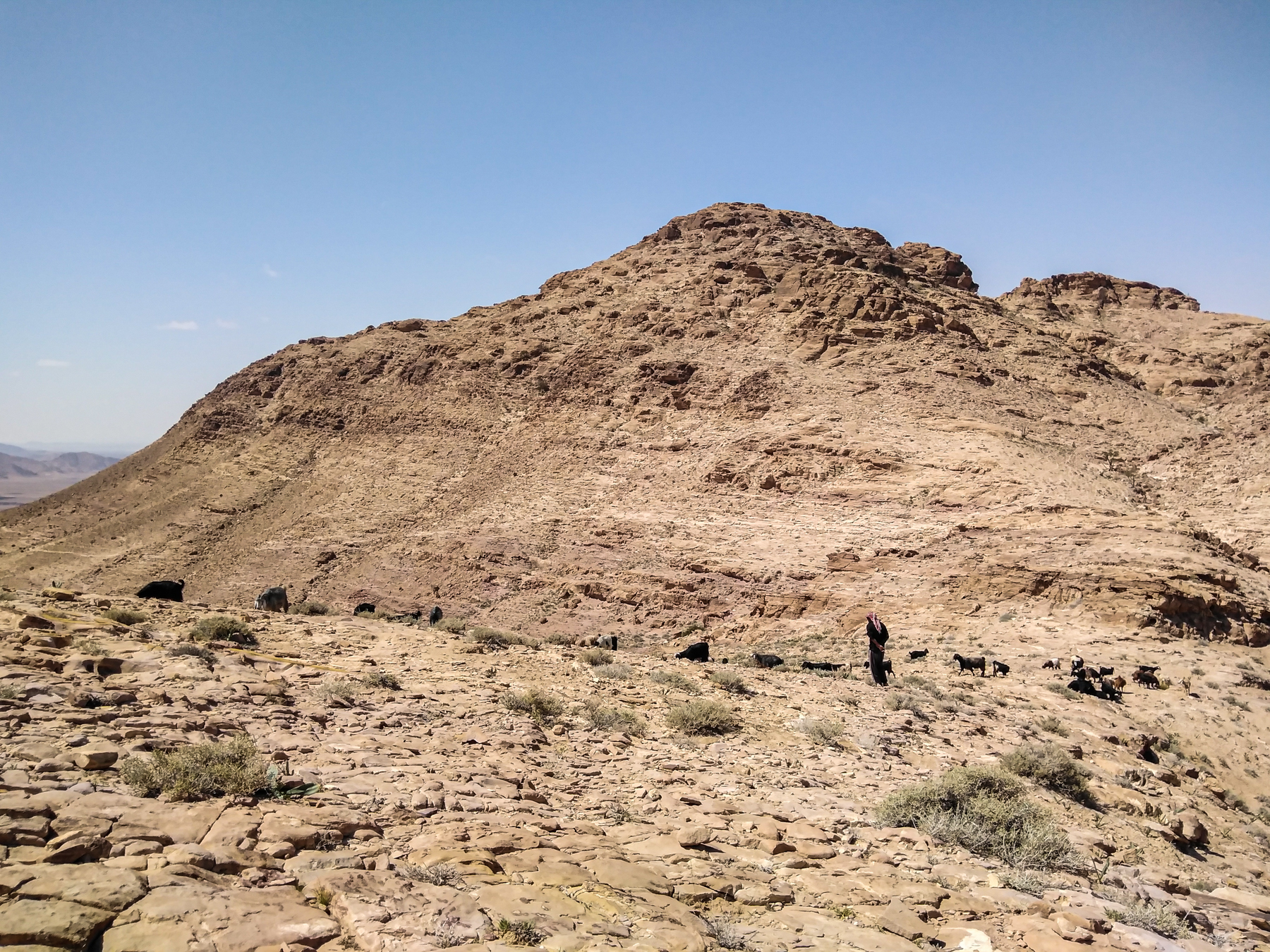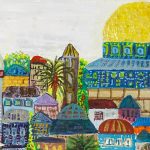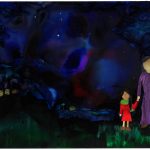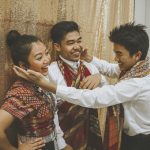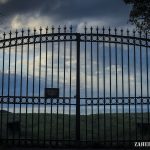Abu Jawad and flock.
STORY AND PHOTOS BY HEATHER M. SURLS
When I saw Mohammad pick sprigs of an herb from among the rocks, I knew we’d be stopping for tea soon. We had been climbing the mountain behind his flock of goats for an hour and a half, with just two brief stops so far. When we reached a bald outcrop of rock overlooking the canyons and mountains of Jordan’s Dana Biosphere Reserve, I sank down cross-legged, tucking my skirt beneath me.
Mohammad is one of the Jordanians who still live in tents in the Wadi Feynan area. He and I had met that morning in a sandy canyon near the Feynan Ecolodge, ranked by National Geographic Traveler in 2013 as one of the world’s top 25 ecolodges. My husband, Austin, and I had spent the night there and woken early to the twittering of sparrows in the hotel’s eaves. Around nine, we’d ventured out to find the local Bedouin shepherd I’d signed up to spend the day with. After introducing ourselves, I set off into the unknown for eight-plus hours with Mohammad and his putty-colored donkey.
I felt a twinge uneasy about spending a day alone with an Arab man. It’s not that I doubted Mohammad’s respectability, but during more than six years in Jordan, I’d never dreamed of crossing the unspoken societal boundary that separates men and women. Now I wanted to muster all the cultural respect I could and let Mohammad know I wasn’t a run-of-the-mill tourist. So right away, I told him I had two sons. He could call me Um David—mother of David. Mohammad replied that he was also married and had a six-year-old son named Jawad and two daughters.
“How old are you?” he asked me.
“Thirty-five,” I replied. “How old are you?”
“Thirty.”
I looked at him with a slight smile. “Then I am your older sister.”
When we arrived at the overlook for our tea break, Abu Jawad—father of Jawad—arranged part of a dry bush in a ring of rocks, then pulled a lighter from one of the donkey’s saddlebags. As he laid out the tea things—a two-liter jug of water, a completely charred kettle, sugar, and loose leaf tea—he made a confession.
“Usually they let me know the night before.”
When he set just one tea glass between us, I realized why Abu Jawad felt compelled to apologize. The ecolodge staff hadn’t informed him that I’d be joining him today, not until they pulled him off the path on his way to work. He washed the glass with water, then dried it with a corner of the red and white checkered shemagh covering his black hair. He wore a black, knit sweater and ratty navy sweats mended with white thread. He’d already kicked off his synthetic leather sandals which were in shambles.
As I sipped sweet tea steeped with the feathery herb he’d picked on the path, Abu Jawad and I ate a simple breakfast: shrak—thinner-than-tortilla flatbread, made by his wife—and whole tomatoes. When I had drank three cups of tea (he insisted on the third), I told him it was his turn. He poured himself a glass, then leaned back on his elbow, legs stretched out.
While Abu Jawad drank his tea, we waited for his herd of 70 to 80 goats to catch up with us. Already, one of my basic assumptions about the shepherding profession had been broken. While I figured he stayed close to his animals, determining their path and keeping them out of trouble, he actually just got them going in the right direction and then walked far ahead of them, stopping every 20 or 30 minutes to wait for them to meander his way.
Soon the goats were in the canyon below us. Abu Jawad stood up, then grunted and whooped, whistled and hissed to guide the multicolored herd. When they weren’t nose-down, snuffling out tender plants or succulent bits of thorny ones, the goats flowed nimbly over the rocky landscape. A couple of times Abu Jawad banged a section of plastic pipe on a rock to get their attention. If a goat was not going the direction he wished, he aimed a rock to land beside it.
We quickly packed our things on the donkey and continued our walk. My long skirt sometimes snagged on the rocks and bushes, and I was glad I’d worn leggings beneath it as well as sturdy shoes. I was also glad I liked vigorous walking. It seemed that shepherding, at least in this rugged country, mostly involved walking. Though I had a hard time imagining this kind of activity day after day, Abu Jawad seemed content with his work. “It’s not tiring,” he said. “You relax.”
I’d never dreamed of crossing this societal boundary, so now I wanted to muster all the cultural respect I could.
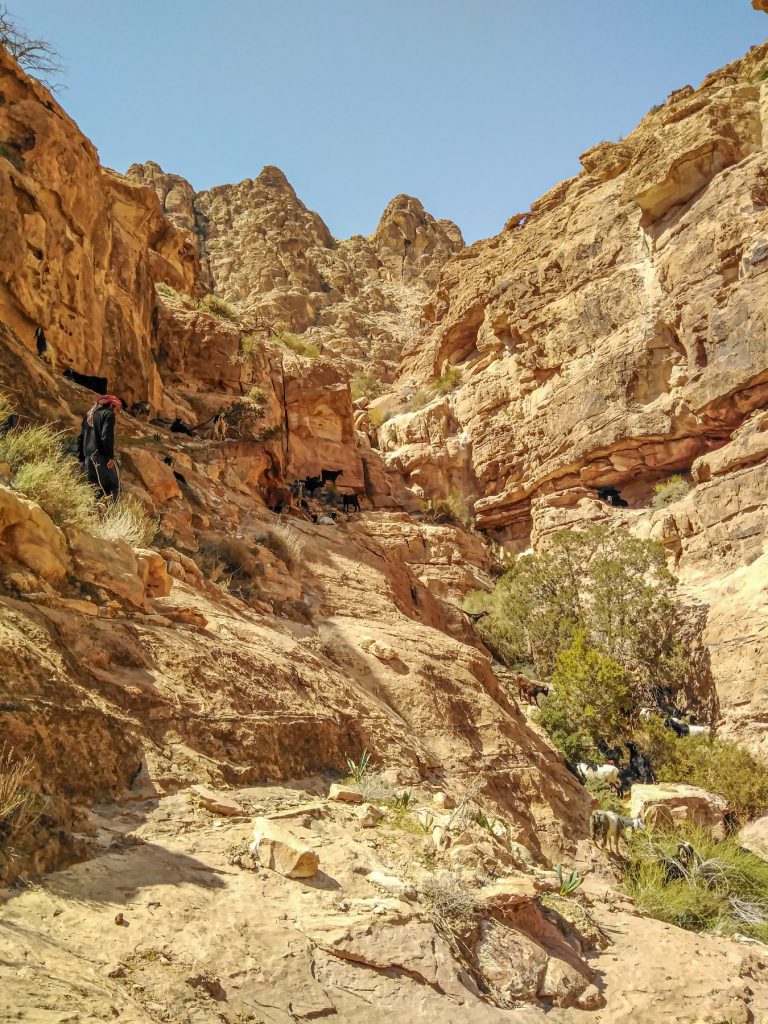
In the green wadi.
Four types of rocks form the mountains and valleys texturing the eastern side of Wadi Al-Araba, the Arabic name for the north-south valley between the Dead Sea and Red Sea: granite, sandstone, basalt, and limestone. Though I have an avowed dislike of geology, here in southern Jordan, taking a preliminary interest in stones seems necessary, unavoidable. As I walked behind Abu Jawad, I tried to at least notice the changes in rock type.
But what caught my attention more than the rocks were the flowers. Though this region receives fewer than three inches of annual rainfall, the hillsides were bursting with vegetation. Most prominent were the broad, sturdy blades that grew in clumps reminding me of tulips. Abu Jawad told me this was the only plant the goats couldn’t eat, as its leaves are toxic. At home, with Jarir Maani’s Field Guide to Jordan, I identified this plant as sea squill, which flowers in the fall with a tall spike of white blossoms.
Abu Jawad also pointed out a shrub I later identified as Anabasis articulata, which he said the Bedouins pound and use as soap. I realized that gaining detailed cultural information like this this was part of why I wanted to spend a day with a shepherd. I wanted to learn more about the Bedouin, these people who had been in Jordan before Jordan was a country. Who were they, and what made them distinct from Jordanians of other backgrounds? As a tourist had asked succinctly the night before, “What makes a Bedouin a Bedouin?” After six years in Amman, I still didn’t have a decent answer to that question.
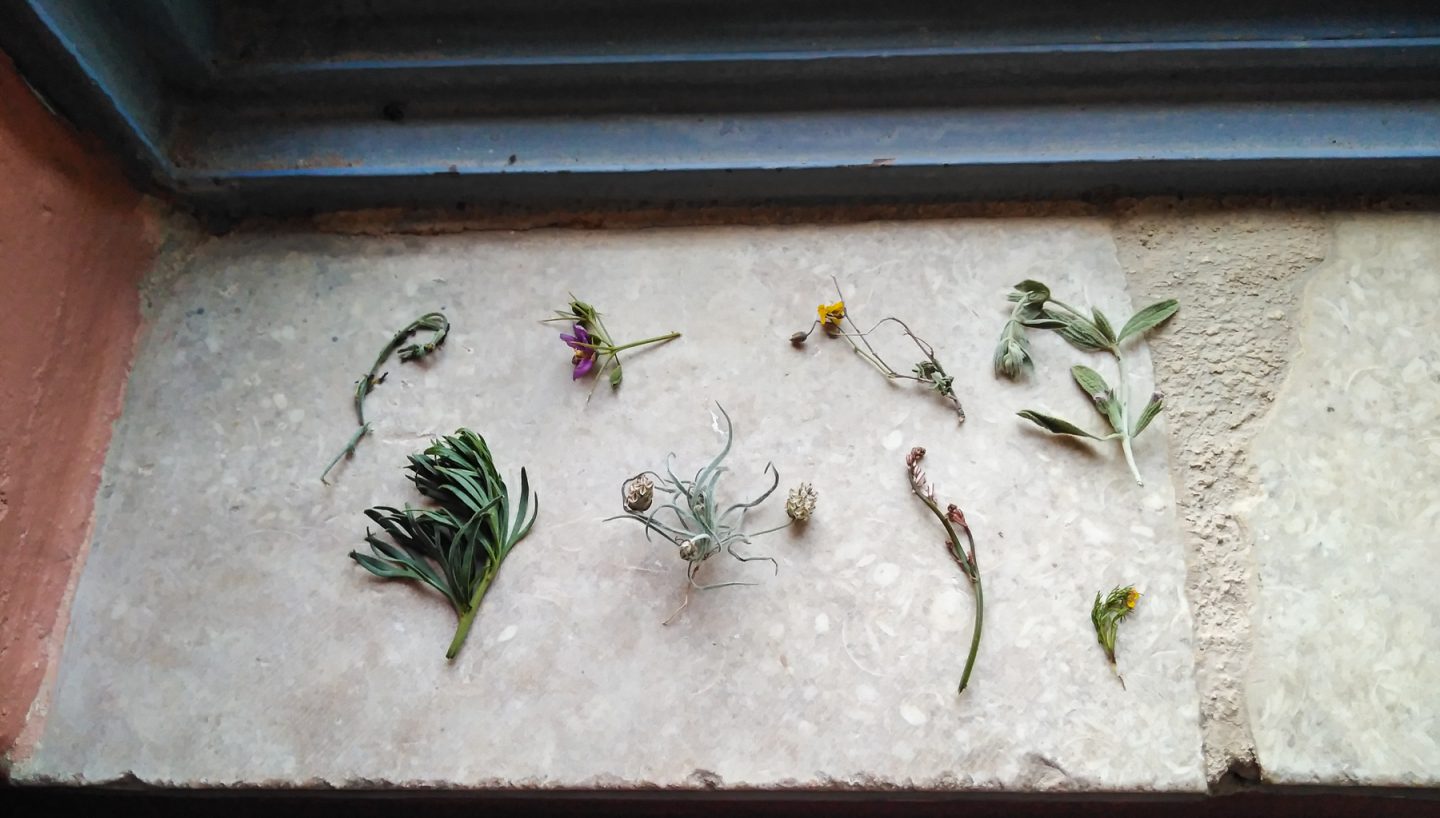
A collection of wildflowers picked in the mountains surrounding Wadi Feynan.
Every time we stopped to wait for the goats, I had more questions for Abu Jawad. For example, what’s the difference between caring for sheep and goats? How long are their pregnancies? When do they give birth? Unfortunately, though I speak Arabic, communication was challenging because the shepherd’s Bedouin accent differed vastly from my city one. I understood about 50 percent of his words, which made my questions multiply faster than I could get them asked.
We scrambled down to a low, sandy place with lots of shrubs, where dragonflies cruised the air. The goats weren’t far behind us; they pranced and galloped over the rocks with their long ears flapping, their flickering tails curled upward. They made me laugh inside, just watching them. A while later, when we stopped in a green wadi, Arabic for a valley or a place where water flows when it rains, the goats emerged from behind rocks, popping out to stare at me with amber and honey eyes while chewing round and round. They were suspicious of me, it seemed. And I don’t blame them. Who wouldn’t be suspicious of someone who chuckled at their disgruntled and complaining bleats?
“Let’s make a pot of milk,” Abu Jawad said. He selected a black goat from the herd and pulled her over, then clamped her back foot under his arm. Grasping a leathery gray teat, he milked her right into the kettle. After adding a generous scoop of sugar to the resulting foamy milk, he heated it in the campfire he’d made, telling me how the Bedouin milk their goats once a day and make butter, samn, and jameed from it. Samn is the Bedouin version of ghee, and jameed is dehydrated yogurt. These three products can be sold for profit, in addition to the meat of goats taken to markets. The Bedouin themselves never have to buy meat, he told me, as all their needs are supplied from their herds.
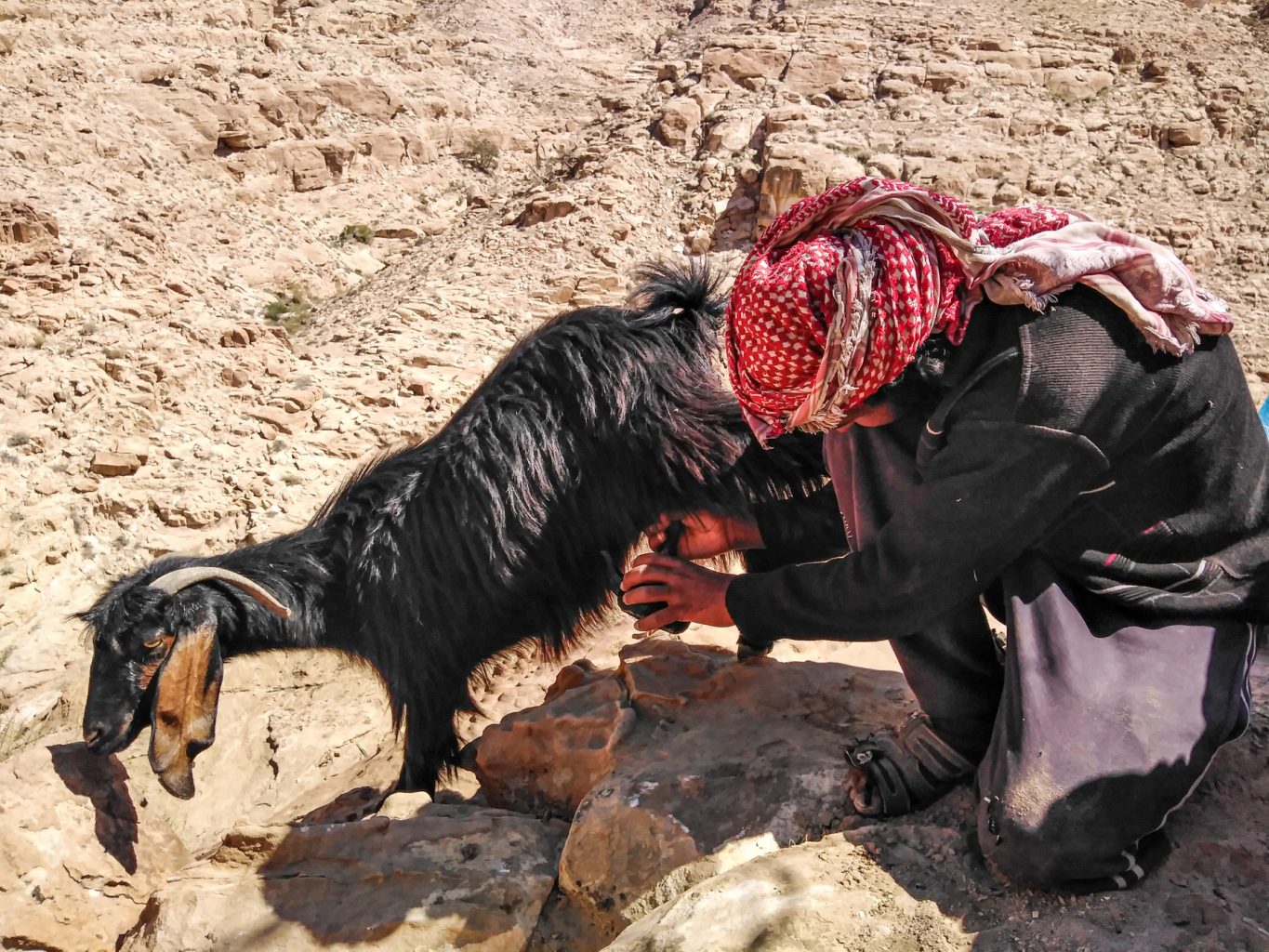
Abu Jawad milking one of his goats.
While we drank sweet milk, the goats rested in the shade. I guessed it was around one o’clock and figured this was the halfway point of our journey. (I snuck occasional time checks on my phone, which was stashed on the donkey. Abu Jawad, however, did not carry a phone or wear a watch.) Sure enough, when we packed up our things, we descended into a valley and turned south again, vaguely in the direction of Wadi Feynan. While we walked at the bottom of a dry riverbed, the goats traipsed along the mountainside far above us. When we stopped at a sandstone concave to rest, Abu Jawad whooped once, his shout echoing back a half-second later. The goats’ bleated response shivered off the rocks.
Close to four o’clock, we took another rest. The goats were far from us, out of sight, but they somehow knew the general direction of home. Abu Jawad wrapped his face in his shemagh and lay down for a nap, using a rock as a pillow. I decided I had nothing else to do, so I would rest too, though it was immensely strange to nap alongside a man. I positioned myself a meter or two above him and stretched out on the dirt, not really sleeping. I listened to birds and wondered what my life would be like if I spent my working days without phone or internet, alone in the cliffs and canyons.
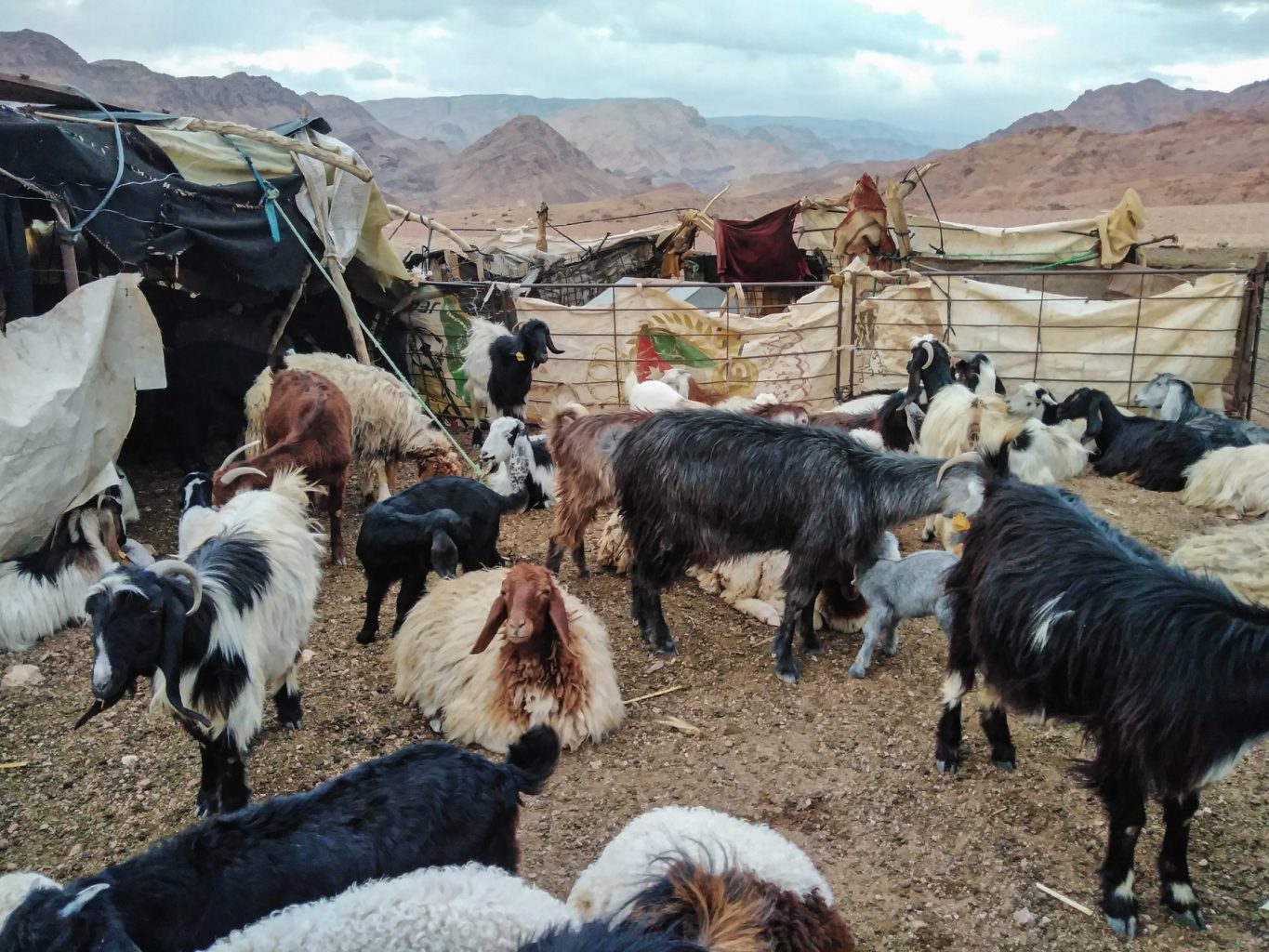
A mixed flock of sheep and goats in Wadi Feynan, Jordan.
When the goats caught up—all swaying ears and hair and udders and wattles—Abu Jawad took a breath and a cloud of flies rose from his scarf. He opened his eyes, engulfed by goats, and looked back at me with a grin. We stood and set off again.
“When you get home, do you count them?” I asked.
Abu Jawad surveyed the crowd around us. “Inshallah, God-willing, they are all here.”
In the distance, a camp emerged. We approached a cluster of three tents, where two old women sat sunning themselves, barefoot. I was surprised by how happy I was to see other women, how, as usual, the sound of women’s voices was more comprehensible to my ears than men’s. One woman had a jacket over her head, and I couldn’t get a good look at her face. The second wore a floral headscarf and had a tiny, bent-over frame and faded tattoo marks on her chin and jaw, a traditional Bedouin marking. I figured we were just passing through, but then Abu Jawad ducked into a small tent on our right. I followed.
The tent was a reception area of sorts, just several meters square with a pit of hot ashes in the center. The walls were pieces of woven plastic stitched together. A hole in the upper corner let in a smoky shaft of light. One of the women handed me a half piece of arboud, the thick, chewy bread shepherds make in the mountains by baking a mixture of flour, salt, and water in hot ashes on the ground.
I overheard Abu Jawad and an older man chatting.
“How was she?” he asked.
“Energetic,” Abu Jawad replied, to my delight.
A slender young woman approached from outside. I greeted her in Arabic, which piqued her interest and drew her in. She settled down across from me, wearing a baseball cap tied down with a maroon headscarf. Her skin was lighter than the older women’s, taut across her facial bones, yet her front teeth were browned from tea. She was a shepherdess, and she asked Abu Jawad where we’d been today. The little old ladies exclaimed about how far he’d taken me.
“I was behind you all day,” the shepherdess told us.
I sensed Abu Jawad was ready to continue home. We walked down the road, now wide and passable for vehicles. I had more questions: What do you think about all day? Do you ever feel lonely? I’ve heard shepherds don’t have a good reputation—is that true? I hesitated, partly because I knew I wouldn’t understand his answers, partly because I knew those kinds of questions would cross an intimate line. Perhaps it was better to keep things practical, introductory for now.
Across the riverbed a woman wearing a black dress with flashing rhinestones called to us. She and Abu Jawad shouted back and forth to each other. I wasn’t sure how they understood one another, their words tumbling up and down the sides of the canyon.
“She thinks you’re my sister, Aisha,” he said, looking over at me. “Call to her.”
I wasn’t sure my voice would carry far enough, but I gave it a try. “Hello!” I shouted in Arabic. “How are you?”
Against the vast landscape, my words sounded thin, insufficient—but I was understood.
In addition to serving as Anthrow Circus's assistant editor and proofreader, Heather Surls regularly contributes stories to the site, drawing inspiration from her relationships and experiences in Amman, Jordan. Her reporting and creative work have also appeared in places like Religion News Service, Christianity Today, Hidden Compass,Catamaran, Brevity, River Teeth, and Nowhere. Her first book, a memoir-in-essays about a decade in the Middle East, releases from Lucid Books in Summer 2025.

